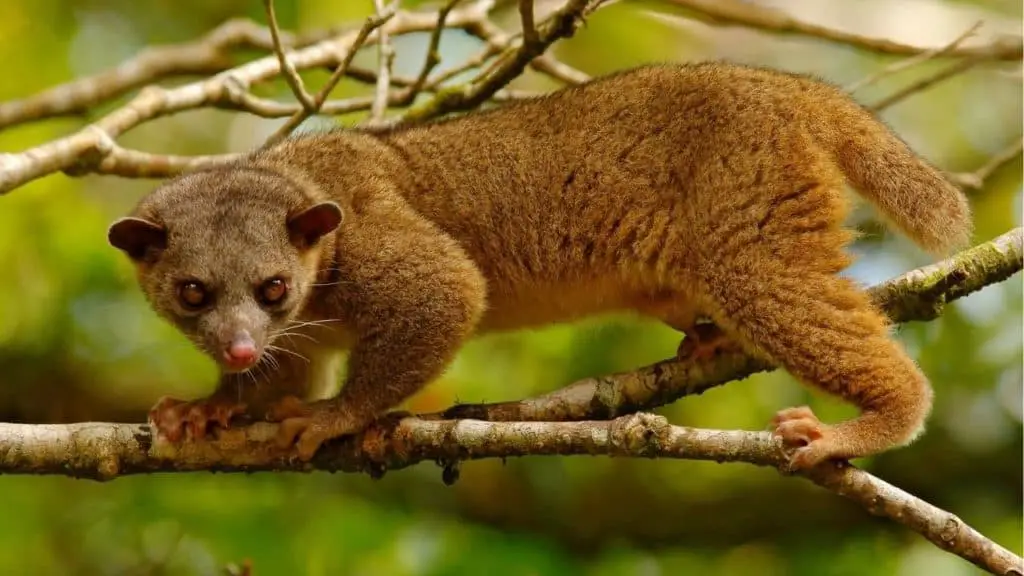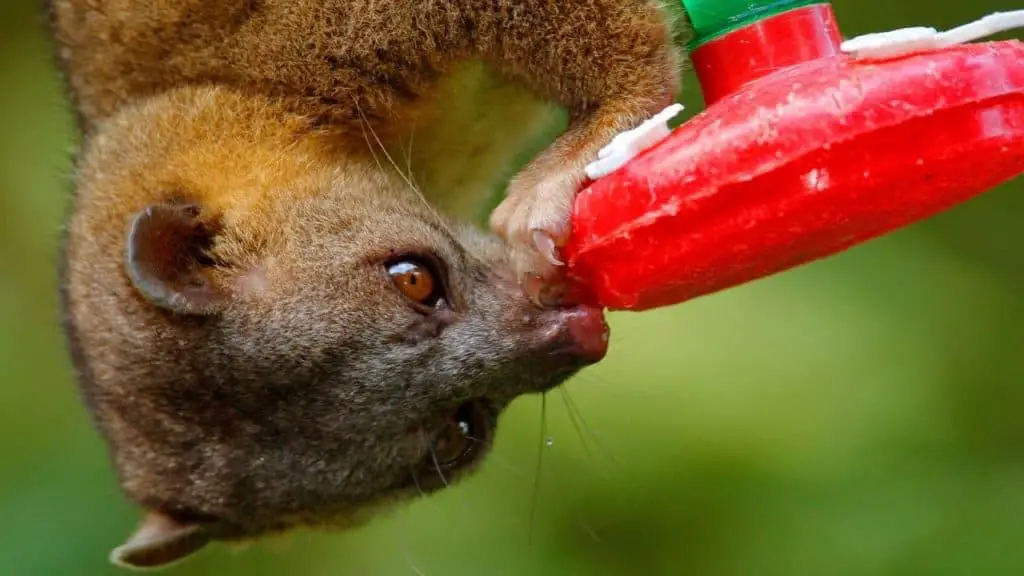Do kinkajous make good pets? No, most people should opt for another pet. Even though it can be legal and possible to keep one of these animals as a pet, they are very demanding and not easy to care for. In this article, you can learn more about what it would be like to own a pet kinkajou.

Is It Legal to Own a Kinkajou?
It can be legal to own a kinkajou. Many US state laws allow residents to own exotic animals, like kinkajous, with a special permit. Things get a little muddy because the regulations differ from state to state.
For example, Delaware doesn’t specifically ban any animals, but the state requires permits to possess exotic or wild creatures. On the other hand, Idaho specifically prohibits people from owning dangerous, non-native animals, including coatimundi and kinkajous.
Additionally, some states permit native animals but ban all non-native creatures. Since kinkajous are native to tropical rainforests in Mexico and Brazil, you’re out of luck in most states.
The same stands true in Canada, where each province handles exotic pets differently. British Columbia heavily regulates exotic animals citing public safety concerns.
Given the legal complexities, it is in your best interest to check with local government officials before purchasing a kinkajou. US and Canadian authorities can leverage significant fines and jail time for violating laws.
Watch the video below to see how a kinkajou became a member of a young family.
Kinkajous Aren’t Domesticated
These furry critters are often mistaken for primates since they resemble a marmoset or squirrel monkey. However, kinkajous are closer to a raccoon than a monkey. Kinkajous are small and cute, like monkeys and raccoons, but they don’t make ideal house pets.
Kinkajous are not domestic animals. They are wild, exotic animals with loads of defense mechanisms, including a sharp bite. They are secretive and wily creatures that live in trees and prefer to roam at will.
Are Kinkajous Dangerous?

Kinkajous are also known as honey bears because they use their long tongues to extract honey from beehives. Don’t let the sweet nickname fool you because these adorable creatures can be downright mean and make you wish you had a pet bear instead!
Honey bears can flip the switch from friendly to aggressive without warning or provocation. They startle easily and don’t hesitate to bite even their favorite humans. The bites may require medical attention because there is evidence that they can cause infections.
Kinkajous Are High Maintenance
Preparing for a pet Kinkajou involves more than traditional pets because it takes more than a cage or kennel, some dishes, and food. You need a large cage, like something large enough for a chimp or gorilla. It needs to be at least 6 feet wide by 8 feet tall by 8 feet long with branches for the kinkajou to swing around and sleep on.
Remember, honey bears are native to tropical rainforests, so it’s important to replicate that habitat as best as you can. You need to keep the temperature over 60° F and at least 50% humidity.
Beyond the intense habitat you need to build, these furry friends require serious grooming and cleaning. Set aside time to clean up the habitat daily because they are messy, can’t be litter trained, and secrete brown oil that they leave everywhere. You also need to bathe them and trim those sharp nails regularly.
Don’t forget the diet! Kinkajous are carnivores with sharp canines, but they mostly eat fresh fruit and veggies.
Where Will You Find a Proper Vet?
These are exotic animals, so not every veterinarian has the knowledge or skill to treat them. If you get your honey bear as a baby, you need to find somebody to spay or neuter it. Plus, you need to keep up with routine care like shots and check-ups.
There are not many exotic pet vets, so you probably would have to travel a distance for each appointment. Even if you find a veterinarian who is willing and able to treat your exotic pet, it will cost substantially more than a dog or cat.
Kinkajous Are Smart and Stubborn
They can’t be litter trained, but that doesn’t mean kinkajous aren’t bright. Kinkajous are hyper, wily creatures that love to work out puzzles, like opening doors and breaking out of cages.
Honey bears may look sweet and innocent, but they are devious thieves and trouble-makers. They don’t just steal honey from beehives. These strong-willed critters constantly seek out amusement. If they get bored, which doesn’t take much, kinkajous leave a path of destruction in their wake.
Live Long and Socialize

Purchasing a honey bear is a commitment that could easily last for 25 years, but some have reached 40 years in captivity. That’s a serious commitment, especially since kinkajous are incredibly social creatures that require a lot of attention when they’re awake at night.
While these furry critters form strong bonds with one or two people, it doesn’t mean they want to cuddle. Kinkajous crave attention in the form of play. They want a lot of attention from their bonded humans and may lash out if they don’t receive enough.
Plus, kinkajous get particular about who comes around, so they don’t do well with many guests or strangers. That means finding a pet sitter could be challenging, and it’s not like you can board a honey bear at a doggy daycare. Does that mean you will never take another vacation or business trip?
How Much Does a Kinkajous Cost?
Kinkajous are high-maintenance pets, and they cost a lot. You have to purchase them from an exotic animal breeder, and you may not find one for sale in your area. You can expect to pay at least $2500 for a baby plus travel expenses to transport your new pet.
The investment doesn’t end there. You also have to buy the cage and habitat supplies. Factor in the cost of maintaining the temperature and humidity needs, especially in colder or drier climates. Then, include the fresh fruit and vegetables you need to buy to keep them fed.
Don’t forget to add in the cost of vet visits and any damage they inflict on your home. Finally, if your area requires a permit to have an exotic animal, you will have to pay a fee for that.
Even if you’re willing to pay the price to have a pet kinkajou, it may not be worth the hassle or risk involved. It’s common for honey bears to turn on their owners, even if they bonded.






